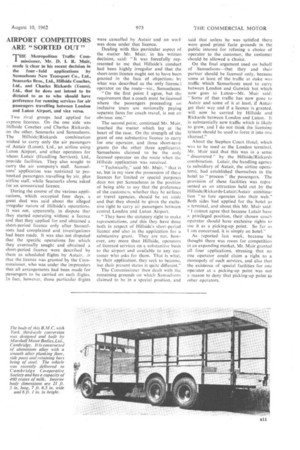AIRPORT COMPETITORS ARE "SORTED OUT"
Page 45

If you've noticed an error in this article please click here to report it so we can fix it.
THE Metropolitan Traffic Commissioner, Mr. D. I. R. Muir, made it clear in his recent decision in
the four fold applications by Samuelsons New Transport Co., Ltd., &amarks Bros., Ltd., Hillside Coaches, Ltd., and Charles Rickards (Tours), Ltd., that he does not intend to be dictated M as to who should have preference for running services for air passengers travelling between London and Luton Airport, and vice versa.
Two rival groups had applied for express licences. On the one side was Hillside Coaches and Charles Rickards; on the other, Seamarks and Samuelsons, 'The Hillside/Rickards combination wished to carry only the air passengers of Autair (Luton), Ltd., an airline using Luton Airport, and other operators for whom Lutair (Handling Services), Ltd., provide facilities. They also sought to carry the air company's staff. Samuelsons' application was restricted to prebooked passengers travelling by air, plus airline staff, while Seamarks alone asked for art unrestricted licence.
During the course of the various applications, which occupied four days, a great deal was said about the alleged irregular nature of Hillside's operations, It was not, apparently, in dispute that they started operating without a licence and that they applied for and obtained a short-period licence only after Samuelsons had complained and investigations had been made. It was also not disputed that the specific operations for which they eventually sought and obtained a short-period licence were described by them as scheduled flights by Autair, or that the licence was granted by the Commissioner, who was under the impression that all arrangements had been made for passengers to be carried on such flights. In fact, however, those particular flights were cancelled by Autair and no worl, was done under that licence.
Dealing with this particular aspect of the matter Mr. Muir, in his written decision, said "It was forcefully represented to me that Hillside's conduct had been highly irregular and that the short-term licence ought not to have been granted in the face of objectiona what was described as the only licensel operator on the route—viz., Samuelsons.
"On the first point I agree, hut the requirement that a coach must be licensed where the passengers proceeding on inclusive tours are notionally paying separate fares for coach travel, is not an obvious one," The second point, continued Mr. Muir, touched the matter which lay at he heart of the case. On the strength of the grant of one substantive licence to carry for one operator, and three short-term grants (to the other three applicants). Samuelsons claimed to be the only licensed operator on the route when the Hillside application was received.
"Technically," said Mr. Muir, "that is so, but in my view the possession of these licences for limited or special purposes does not put Samuelsons in the position of being able to say that the preference of the customers, whether they be airlines or travel agencies. should be set aside and that they should be given the exclusive right to carry air passengers between central London and Luton Airport.
"They have the statutory right to make representations, and this they have done both in respect of Hillside's short-period licence and also in the application for a substantive grant. They are not, however, any more than Hillside, operators of licensed services on a substantive basis to the airport and available to any customer who asks for them. That is what, by their application, they seek to become, but their present status is quite different."
The Commissioner then dealt with the remaining grounds on which Samuelsons claimed to be in a special position, and
said that unless he was satisfied there were good prima facie groundsin the public interest for refusing a choice of operator to the customer, the customer should be allowed a choice.
On the final argument used on behalf of Samuelsons—that they and their partner should be licensed only, because some at least of the traffic at stake was traffic which Samuelsons used to carry between London and Gatwick but which now goes to Luton—Mr. Muir said: "Some of that traffic has now gone to Autair and some of it at least, if Autair get their way and if a licence is granted. will now be carried by Hillside and Rickards between London and Luton. It is substantially new traffic which is likely to grow, and I do not think the licensing system should be used to force it into one channel."
About the Stephen Court Hotel, which was to be used as the London terminal. Mr. Muir said that this was in a sense " discovered " by the Hillside/Rickards combination. Lutair, the handling agency (a subsidiary of Autair, the airline operators), had established themselves in the hotel to " process " the passengers. The provision of these facilities was represented as an attraction held out by the Hillside/Rickards-Lutair/Autair combination "to lure agencies into their web," Both sides had applied for the hotel as a terminal, and about this Mr. Muir said: "I cannot agree that because Lutair have a privileged position, their chosen coach operator should have exclusive rights to use it as a picking-up point. So far as I am concerned, it is simply an hotel."
As reported last week, because he thought there was room for competition in an expanding market, Mr. Moir granted all four applications, stressing that no one operator could claim a right to a monopoly of such services, and also that the existence of special facilities for one operator at a picking-up point was not a reason to deny that picking-up point to other operators.
















































































































